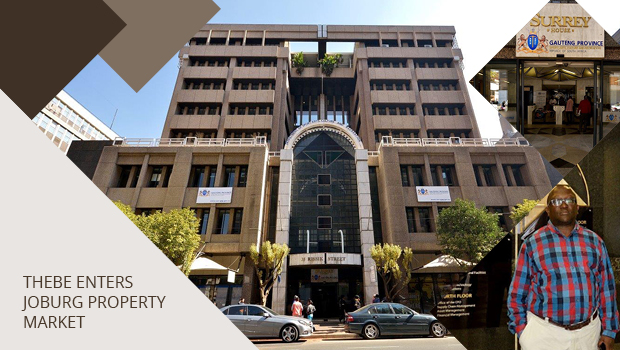Thebe enters Joburg property market
It is no quintessential Friday afternoon for Ben Nokaneng,Financial Director of Thebe Property Asset Management (TPAM). Over the last four months, his team of contractors has been working tirelessly to get the towering landmark 8-storey Surrey House (35 Rissik Street) in downtown Johannesburg ready for its new tenant – the Gauteng Provincial Department of Sports, Arts & Culture and Recreation. TPAM acquired the building last year.
Like an athlete approaching the finish line, Ben has been pacing up and down the building in anticipation of his ensemble of contractors putting the final touches to the building that will be home to the new tenant for the next five years. The building is a hive of activity and signals TPAM’s arrival in the South African property sector. Plumbers, electricians, painters, cleaners, landscapers, and a company installing new furniture and computers are all working in unison to get the building in an immaculate condition.
Thebe Times spoke to Ben about the company’s strategy and its future plans.
- When was TPAM formed and what segments of the property market is the company investing in?
TPAM was established in 2011 as a property investment company with a vision to contribute to the broad transformation agenda through making strategic property investments such as the Surrey House acquisition. The market segments in which we operate in are commercial, student accommodation and low-cost housing, rural and peri-urban retail markets. These market segments have been strategically identified as key growth markets which TPAM could build a portfolio of income-producing properties that would have a resultant socio-economic impact.
- Tell us more about Surrey House building. What does its acquisition mean for TPAM?
Johannesburg has always been the heart-beat of the Gauteng Province and for many years the city has witnessed a flight of private sector investment which has led to a decline in the state of the city’s infrastructure and property values. As TPAM, we view the Surrey House acquisition as a significant boost to the Gauteng Provincial Government’s efforts of driving inner city rejuvenation. To this, it is a testament to our commitment, as propagators of transformation, to the broad transformation agenda of the country and specifically of the property sector at large. With respect to Surrey House, it is situated at 35 Rissik Street. The property has a total gross lettable area of 11 738m2 of which 830m2 is retail (“the retail space”) and 10 908m2 is office (“the office space”). In recent times, there has been a flurry of black managed property companies that have listed on the JSE. These companies business model are underpinned by favourable black economic empowerment (BEE) legislation in the government lease space for empowered entities. There is strong demand for income-yielding properties with strong leases thus assets such as Surrey House are in huge demand.
- It has been said that TPAM is seeking to encourage the transformation and normalisation of the South African property sector by creating opportunities for black property developers. How does TPAM plan to encourage increased participation of black players in the property sector?
Johannesburg has always been the heart-beat of the Gauteng Province and for many years the city has witnessed a flight of private sector investment which has led to a decline in the state of the city’s infrastructure and property values. As TPAM, we view the Surrey House acquisition as a significant boost to the Gauteng Provincial Government’s efforts of driving inner city rejuvenation. To this, it is a testament to our commitment, as propagators of transformation, to the broad transformation agenda of the country and specifically of the property sector at large. With respect to Surrey House, it is situated at 35 Rissik Street. The property has a total gross lettable area of 11 738m2 of which 830m2 is retail (“the retail space”) and 10 908m2 is office (“the office space”). In recent times, there has been a flurry of black managed property companies that have listed on the JSE. These companies business model are underpinned by favourable black economic empowerment (BEE) legislation in the government lease space for empowered entities. There is strong demand for income-yielding properties with strong leases thus assets such as Surrey House are in huge demand. Initially when TPAM was conceived, the inspiration was to form a “development fund’ that would invest in opportunities alongside new black entrants in the property space. This was to ensure that black players hold equity positions invariably encouraging ownership of commercial property. It is also important to mention that the Surrey House acquisition has created job opportunities for emerging contractors and labourers especially through the restorative project to get the building ready for our new tenant.
- Pre-2008 economic crisis, the South African property market was in a boom. Since then it has experienced slow growth. What is the future of the local market going forward?
The property sector like many other domestic sectors is driven by the growth of the economy. While, we have not experienced an uptick in economic growth, we are optimistic that the sector holds great opportunities spurred by government infrastructure developments; increased investment in education and provision of low-cost housing. The approach from a TPAM point of view is that we aim to have a dual approach to student and affordable housing since there is dual usage of the two asset classes. The commercial property sector will remain an area of interest where there are opportunities to convert short-term leases into long-term leases and thus improve the yields on the assets. The rural retail sector also has a great deal of opportunity as we view the urban sector of the market as overtraded.


